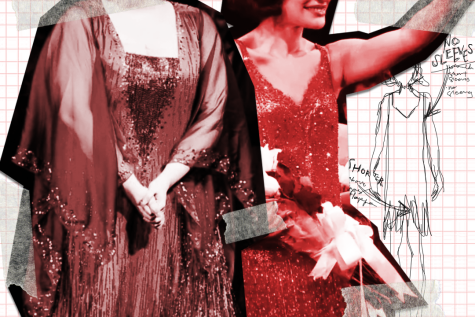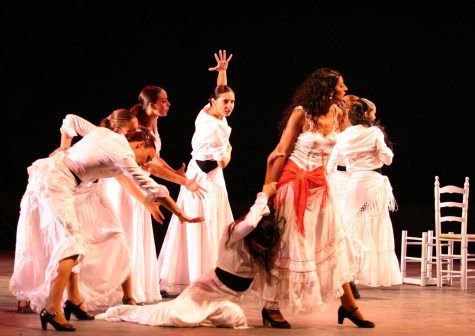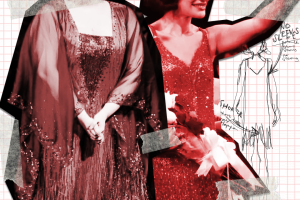Goodbye Glee, Hello Gorgeous
Lea Michele returns to the Broadway stage in the critically acclaimed revival of the Jules Styne classic, “Funny Girl”
Through the eyes of a rising star, “Funny Girl” explores the ups and downs of being a part of the entertainment industry.
March 31, 2023
“Funny Girl,” the heart-wrenching tale of Fanny Brice’s rise to stardom and the downfall of her marriage, leaves the audience yearning for that once-in-a-lifetime whirlwind romance. The show’s plot involving two lovers who succumb to the odds are as relevant today as they were during the show’s original run in 1964. This Golden Age revival brings new life to Broadway through its magnificent direction and immensely talented cast.
An electric chemistry fuels the rollercoaster relationship between Fanny Brice (Lea Michele) and Nick Arnstein (Ramin Karimloo). A star-crossed affair driven by infatuation and inspiration, Michele and Karimloo allow the audience to take a peek into their characters’ souls, a level of vulnerability rarely seen in contemporary shows.
“Funny Girl” romanticizes and exaggerates the story of legendary performer and actress Fanny Brice, who came to fame in 1910 as the headliner for the “Ziegfeld Follies.” The show accurately depicts the standards for female performers at the time: pretty, tall, voluptuous and white. Fanny was the antithesis of this standard: cute, short, scrawny and ethnically Jewish. The rest of Fanny’s story is exaggerated, beginning with Fanny being fired from the chorus of a show because “if a girl isn’t pretty like a Miss Atlantic City, she’s a real Miss Nobody USA.”
Michele beautifully explores how Fanny’s lack of traditional beauty greatly affected her at the beginning of her career, especially as Fanny prioritizes her career over getting married and starting a family, a controversial decision that garners her many critiques. The audience sees a dichotomy between what has coyly been referred to as a “modern woman” and what is known as a “Sadie” in the show. Sadie is the daughter of a staple character of the neighborhood but does not contribute anything to the plot of the story besides being discussed in order to remind Fanny of the societal standard she is held up against. Fanny finds strength, security and self-love in Nick Arnstein, their union finally making her a “Sadie, Sadie, married lady.”
The show does not just explore her professional success but also provides an in-depth look at her humanity, weakness and love life. Michele and Karimloo’s chemistry allows the audience to experience the nuance of a relationship like that of Nick and Fanny. As their love and Fanny’s success blossom, we see that love sometimes cannot prevail.
Their unconventional love story begins with a romanticized version of Nick being awestruck with Fanny’s uniqueness and talent. Fanny becomes infatuated with his beauty and validation. Ultimately, Nick’s internalized toxic masculinity and Fanny’s success strain their relationship more than love could ever repair it. Through their yearning for mutual understanding, fighting for power and grasping onto their glamorized romance, the audience is given an intricate tale of impossible love.
Michele and Karimloo have an unreplicable connection that allows them to accentuate their characters’ vulnerability and complicated relationship. As Fanny gains wealth and adoration, Nick experiences poverty and embarrassment. The gentle dynamic of the painstaking dialogue between Fanny and Nick as he tries to regain control as a breadwinner depicts the complexity of fractures in their relationship. No other actors could replicate the chemistry, trust and talent that Michele and Karimloo have, which allow them to navigate, together, the emotional truth of their characters’ relationship.
Not only do Karimloo and Michele give a stunning performance, but the supporting characters and ensemble reflect how Fanny and Nick’s relationship is destructive to those around them. Tovah Feldshuh plays the quintessential Jewish mother, Mrs. Brice, with her comedic timing, never-ending support and guidance defining her relationship with Fanny. Jared Grimes, who plays Eddie Ryan, gives a remarkable tap performance and gorgeously depicts the unrequited love Eddie has for Fanny.
The show’s diverse ensemble consisting of the extraordinary talents of Amber Ardolino, Mariah Reives, Leslie Blake Walker, Aliah James, Masumi Iwai and so many others breaks the mold of your typical Ziegfeld chorus girl, righting Ziegfeld’s wrongs and showing the world that talent is not restricted to particular colors or shapes.
“Funny Girl” is a masterpiece that addresses women’s roles in the entertainment industry, how toxic masculinity and insecurity destroy relationships, and how love can suffocate. With its updated and re-imagined composition, direction and storytelling, “Funny Girl” brings new life to a classic tale of show business woes: love, insecurity, destruction and heartbreak. “Funny Girl” gives a voice to a generation that is still plagued by personal struggles similar to those of Fanny and Nick. Fanny’s story is everyone’s story. “Funny Girl” will “belong to the ages. The ages.”



















